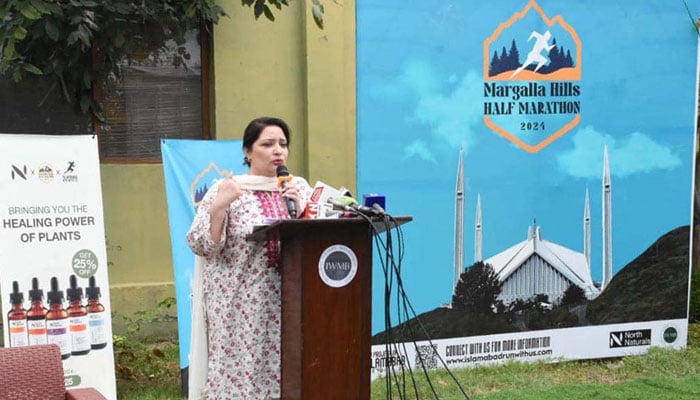‘Engaging youth vital to tackle plastic pollution’
Islamabad:Coordinator to the prime minister on climate change Romina Khurshid Alam on Sunday said that plastic pollution was a major cause of environmental degradation but tackling it was a daunting challenge because of the massive use of plastic goods in the country.
She, however, said the government was committed to making the country plastic-free with the help and cooperation of stakeholders. “Our youth, who are the frontline contingent force, can play a pivotal role in ensuring a plastic-free environment by advocating for sustainable policies, developing skills in green industries, starting or joining green businesses, and actively participating in the implementation of strategies to combat plastic pollution, which is a major source of environmental degradation in our country,” she told the concluding ceremony for the Margalla Hills Half-Marathon here. Meant to raise public awareness of climate change and plastic pollution, the 21-km-long marathon was jointly organised by the Ministry of Climate Change and Environmental Coordination, the Islamabad Wildlife Management Board, and various civil society organisations. It was attended by around 200 men, women and children.
The PM’s coordinator highlighted the role of the young people in eliminating plastic pollution and supporting the government’s efforts for it. She urged the youth to take the lead and responsibility to overcome plastic pollution in the country, which, she said, had adversely contaminated soils, water bodies, oceans, natural ecosystems, and affected human and wildlife health.
Ms Romina said the key challenge was the educating and sensitizing young people about adverse impacts of plastic pollution not only on environment but also lives. She said that educating young people about single-use plastics, encouraging them to alter their attitude towards plastic consumption and spark behavioural change in their communities was key step towards making our society plastic-free.
"This could be achieved through creating awareness through invoking self-reflection, initiating dialogues with authorities at schools and businesses to encourage them to reduce their consumption of single-use plastic products from the grassroots level," she said. The PM's coordinator also said the marathon was a reminder that irrespective of age, occupation or financial background, everyone had a challenging role to play in shaping the world they wanted to live in and leave behind for the next generations.
She said the event was basically a part of the awareness regarding the adverse impacts of climate change, environmental degradation due to plastic pollution and advocacy initiative for drawing public support for the present government’s green initiatives including Green Pakistan Programme. "I hope today’s marathon event would prove as the key steps into environmental leadership and lead to an impact in changing the plastic habits of our people on companies and schools to act on pollution,” she said.
Ms Romina said that the world of today faced a crisis of plastic pollution at a scale that was never seen before but its impacts were not felt equally. She added that from the production to the disposal of plastics, the most vulnerable communities often experienced the worst effects of pollution in different forms and manifestation.
“Plastic pollution is a crisis of our own making but the good news is that we can control it when we all join hands,” Romina Khurshid Alam told the participants, adding tha the UN Global Treaty to End Plastic Pollution provides a important framework for ensuring that plastics never end up as trash. “It is heartening to note that there is a strong support for the treaty by governments and businesses, buoyed by overwhelming support among global consumers to cope with plastic pollution,” she said.
-
 Climate Nearing Dangerous Tipping Points, Study Shows
Climate Nearing Dangerous Tipping Points, Study Shows -
 James Van Der Beek, 'Dawson's Creek' Star, Dies At 48
James Van Der Beek, 'Dawson's Creek' Star, Dies At 48 -
 Threads Launches Dear Algo AI Feature To Personalise Feeds In Real Time
Threads Launches Dear Algo AI Feature To Personalise Feeds In Real Time -
 Police Take Action Over Andrew's Ties With Jeffrey Epstein While In UK Office
Police Take Action Over Andrew's Ties With Jeffrey Epstein While In UK Office -
 Courtney Love Makes First Appearance Since New Report On Kurt Cobain's Death
Courtney Love Makes First Appearance Since New Report On Kurt Cobain's Death -
 King Charles Anxious As Uncertainty Grows Over Sarah Ferguson’s Next Move
King Charles Anxious As Uncertainty Grows Over Sarah Ferguson’s Next Move -
 Real Reason Kim Kardashian Is Dating Lewis Hamilton
Real Reason Kim Kardashian Is Dating Lewis Hamilton -
 Rihanna Leaves Elderly Woman Star-struck In Viral Grocery Store Video
Rihanna Leaves Elderly Woman Star-struck In Viral Grocery Store Video -
 TikTok US Launches Local Feed Using Precise Location Data
TikTok US Launches Local Feed Using Precise Location Data -
 Jill Biden’s Former Husband Charged With Wife’s Murder
Jill Biden’s Former Husband Charged With Wife’s Murder -
 Zayn Malik Reveals Parenting Decision Gigi Hadid Criticized Him Over
Zayn Malik Reveals Parenting Decision Gigi Hadid Criticized Him Over -
 Palace Releases Prince William's Photos From Final Day Of His Saudi Arabia Visit
Palace Releases Prince William's Photos From Final Day Of His Saudi Arabia Visit -
 Microsoft Warns Of AI Double Agents As Enterprise Adoption Of AI Agents Surges
Microsoft Warns Of AI Double Agents As Enterprise Adoption Of AI Agents Surges -
 Kate Middleton, Prince William Break Silence Over Tragic Shooting In Canada
Kate Middleton, Prince William Break Silence Over Tragic Shooting In Canada -
 'Finding Her Edge' Star Madelyn Keys Explains Adriana's Remarks About Brayden Romance
'Finding Her Edge' Star Madelyn Keys Explains Adriana's Remarks About Brayden Romance -
 Royal Expert Raises Questions Over Sarah Ferguson's 'plotting' Stunning Comeback
Royal Expert Raises Questions Over Sarah Ferguson's 'plotting' Stunning Comeback




